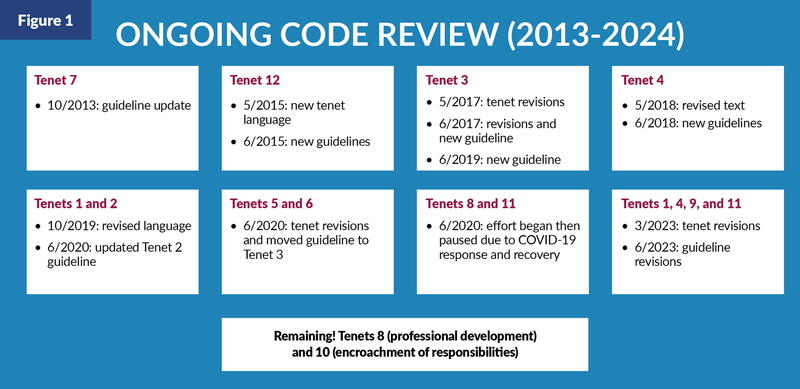A foundational element of the local government management profession is the ICMA Code of Ethics. It’s the standard that all members agree to uphold and is reinforced through ongoing education and training, such as this column! One of the key aspects of the Code is ensuring it remains as relevant today as it was 100 years ago when it was adopted at the 1924 ICMA Annual Conference in Montreal. This responsibility primarily rests with the ICMA Executive Board’s Committee on Professional Conduct (CPC).
In 2013, the Board approved the CPC’s plan to engage the membership in a structured review of the Code. The approach ensures the Code continues to ethically guide those working in service to local government as we begin the next 100 years. This comprehensive effort facilitated discussion about the language and values in the Code, as well as the guidelines that help interpret its principles.
It is fitting that this year, on the Code’s 100th anniversary, ICMA concludes this cycle by examining Tenet 8 on professional development and Tenet 10 on job encroachment.
Where We Have Been
The review for each tenet began by gathering feedback at regional and state events. Those proposed changes were presented to members via a survey. The dialogue then informed proposed tenet revisions and guidelines that accompany some tenets, which members approved by ballot as specified in ICMA’s Constitution for the board’s adoption. As part of this review, Tenets 1, 2, 3, 4, 5, 6, 7, and 12 and/or the guidelines have been revised. The summary of this comprehensive effort follows:
• Tenet 7: No change to the tenet language; the board voted to adopt amendments to the guidelines in September 2013.
• Tenet 12: Members approved new tenet language in May 2015, and the board approved new guidelines in June 2015.
• Tenet 3: The membership approved revised tenet language in May 2017. The board voted to adopt revisions to the language for the existing guidelines, drafted a new guideline on personal relationships, and revised the language on personal relationships that create conflicts of interest under Tenet 12 in June 2017. Based on the CPC’s recommendation, and apart from the structured review process, the board adopted a new guideline on conduct unbecoming in June 2019.
• Tenet 4: Members approved a change to the tenet language in May 2018. The board adopted two new guidelines on inclusivity and diversity and moved the amended guideline on length of service to Tenet 3 as it relates more to the professional commitment to integrity in June 2018.
• Tenets 1 and 2: Concluding a review process that first began in 2017, membership approved changes to the tenet language in October 2019.
• Tenets 5 and 6: Membership approved revisions that updated the tenet language to highlight the member’s role in collaborating with elected officials to set goals for the community and organization, then the board approved moving the conflicting roles guideline from Tenet 5 to Tenet 3, where it is now aligned with the existing guidelines on conflicts of interest.
• Tenets 1, 4, 9, and 11: Over three years and more than 15 member feedback sessions provided ICMA’s consultant (the School of Government at the University of North Carolina) with expertise on proposed changes. Through a special election ballot in March 2023, 84% of corporate members approved proposed changes. Notably, this special election holds the distinction of having the highest participation rate (31%) in ICMA’s online voting history. The board approved the changes to the associated guidelines at its June 2023 meeting.
Figure 1 summarizes the effort.

Tenets 8 and 10
Thank you to the members that already provided feedback through facilitated discussion on these two remaining tenets at conference sessions this year. Since ICMA has more than 13,000 members, many have not weighed in on the tenets or their guidelines, so brief a history follows.
Tenet 8 on Professional Development
As background, Tenet 8’s current language reads: “Make it a duty continually to improve the member’s professional ability and to develop the competence of associates in the use of management techniques.”
The first statement emphasizing professional development appeared in the Code’s 1952 version, “The city manager considers it his duty continually to improve his ability and his usefulness and to develop the competence of his associates in the use of management techniques.” That principle was restated three times with the last revision in 1976 reflecting the current language. The other two revisions:
1969: Make it his duty continually to improve his ability and his usefulness and to develop the competence of his associates in the use of management techniques.
1972: Make it his duty continually to improve his ability and to develop the competence of his associates in the use of management techniques.
In 1995, two guidelines were added:
Self-Assessment. Each member should assess his or her professional skills and abilities on a periodic basis.
Professional Development. Each member should commit at least 40 hours per year to professional development activities that are based on the practices identified by the members of ICMA.
Tenet 10 on Job Encroachment
The current language of Tenet 10 is: “Resist any encroachment on professional responsibilities, believing the member should be free to carry out official policies without interference, and handle each problem without discrimination on the basis of principle and justice.”
The principle was first included in the Code’s 1938 version, “The city manager, in order to preserve his integrity as a professional administrator, resists any encroachment of his control of personnel, insists on the exercise of his own judgment in accomplishing council policies, and deals frankly with the council as a unit rather than secretly with its individual members.” It has been amended over the years with the most recent version in 1995 reflecting the current language. The other three revisions:
1952: The city manager, in order to preserve his integrity as a professional administrator, resists any encroachment on his responsibility for personnel, believes he should be free to carry out council policies without interference, and deals frankly with the council as a unit rather than with its individual members.
1969: Resist any encroachment on his responsibilities, believing he should be free to carry out official policies without interference.
1972: Resist any encroachment on his responsibilities, believing he should be free to carry out official policies without interference, and handle each problem without discrimination on the basis of principle and justice.
In 1995, a guideline was added:
Information Sharing. The member should openly share information with the governing body while diligently carrying out the member’s responsibilities as set forth in the charter or enabling legislation.
What’s Next?
Every member’s perspective can help shape the direction and next steps, so please complete the survey by July 31 to add your voice to this important process. ICMA routinely receives more than 2,000 written comments on ethics surveys so don’t be shy in sharing yours. The CPC will review all comments and responses later this year and determine the next steps. We will update members on this effort in the Leadership Matters enewsletter. Thank you in advance for adding your valuable perspective on these last two principles!

JESSICA COWLES is ethics director at ICMA (jcowles@icma.org).
New, Reduced Membership Dues
A new, reduced dues rate is available for CAOs/ACAOs, along with additional discounts for those in smaller communities, has been implemented. Learn more and be sure to join or renew today!
